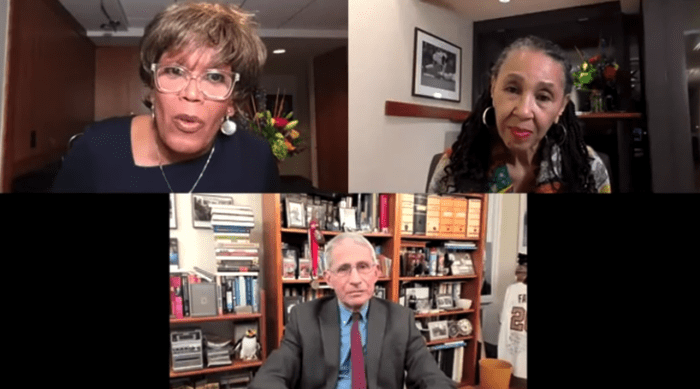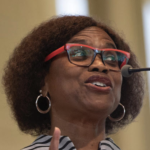
“Fauci recognized our distrust in the medical system but assured the audience that the speed of the vaccine does not compromise its safety nor scientific integrity.”
Massachusetts hospitals are filling up again, like those across the country. Many of the patients are Blacks and Latinx Americans, the demographic groups disproportionately slammed by the coronavirus pandemic. The good news is that a vaccine is just weeks away from distribution. The troubling question is, will Blacks and Latinx Americans show up?
“I am not feeling this vaccine, and I’m certainly not feeling like being in the guinea pig phase,” Rev. Emmett Price said on our podcast, All Rev’d Up. Like many Black ministers across the country, Price is not confident in telling his congregation to be the first in line for the vaccine.
Price is not alone in his skepticism about the COVID-19 vaccine. His reservations derive from a history of hyper-experimentation on Black bodies, intergenerational trauma as its result, and the continued health disparities that resonate to this day.
In recognizing the high levels of hesitancy among Blacks to get vaccinated among her parishioners and the community at large, Rev. Liz Walker, the senior pastor of Roxbury Presbyterian Church and a former WBZ anchor, reached out to the country’s most trusted voice on the issue—Dr. Anthony Fauci. Fauci is the director of the National Institute of Allergy and Infectious Diseases. On Nov 26, Walker conducted a webinar titled, “Where do we go from here? Coping in the next season of the COVID-19 pandemic,” where Fauci spoke to the Roxbury community. The webinar was part of the Cory Johnson Program for Post Traumatic Healing at Roxbury Presbyterian Church.
Fauci recognized our distrust in the medical system but assured the audience that the speed of the vaccine does not compromise its safety nor scientific integrity. However, with concern, Fauci mentioned the lack of diversity in the clinical trials for the vaccine and wished more minorities were in them, stating, “What’s safe and effective should not be only for whites.”
The presidents of Xavier University, and Dillard University, HBCUs in Louisiana, volunteered for COVID-19 trials with the hopes of recruiting their students as a way to bridge the chasm between the Black community and the medical system. In addressing both students’ and their families’ fears and concerns about the trials, though, the Bioethics Commission stepped in. It stated: “We cannot allow our children to be an instrument of anyone inadvertently or intentionally misdirecting and politicizing the research on COVID-19 for their political interest.”
Under the arrangement, students at both schools would have access to free COVID-19 tests and a donation worth $15 million from the lab equipment company Thermo Fisher. However, no amount of money can assuage or erase the collective trauma of so much medical experimentation done on our bodies. It’s in our historical DNA. Many African Americans, young and old, cannot shake off the Tuskegee study, a clinical experiment conducted for four decades, between 1932 and 1972, to observe untreated syphilis in African American men under the pretense that they were receiving free health care. The Tuskegee study’s deleterious effects on these men, their families, and their offspring have resulted in a lifelong hell of mental and health complications.
In 2010, Americans learned about Henrietta Lacks, a poor tobacco farmer from Virginia, from the New York Times bestseller, The Immortal Life of Henrietta Lacks by Rebecca Skloot. Lacks was an African American woman whose cancer cells are the HeLa cell line source, the first immortalized human cell line in medical research. Lacks’ cells were essential in developing the polio vaccine and the study of leukemia, the AIDS virus, and various cancers. They went up in the first space missions to see what would happen to cells in zero gravity. Her cells were taken without consent, and to this day, the Lacks family is suing Johns Hopkins for compensation.
In 2018, a statue of J. Marion Sims, called the “father of gynecology,” erected in 1890, was finally removed from New York’s Central Park. The statue stood across from the New York Academy of Medicine. Sims perfected his revolutionary tools like the vaginal speculum, a double-bladed surgical instrument used for examining the vagina and cervix, and gynecological surgeries on enslaved black women without the use of anesthesia. “After perfecting the techniques on black enslaved women without anesthesia in America, Sims went on to offer the procedure in Europe to wealthy white women who were sedated,” USA Today reported.
The hesitancy among Black people to embrace vaccines is understandable. I am asked constantly if I will get the COVID-19 vaccine. I demur, conveying that I don’t know yet. My spouse is an ER physician and will get vaccinated before me. She is my canary in a coal mine.
Rev. Irene Monroe can be heard on the podcast and standing Boston Public Radio segment ALL REV’D UP on WGBH (89.7 FM). Monroe’s syndicated religion columns appear and the Boston voice for Detour’s African American Heritage Trail. She is a s a Visiting Researcher in the Religion and Conflict Transformation Program at Boston University School of Theology.

